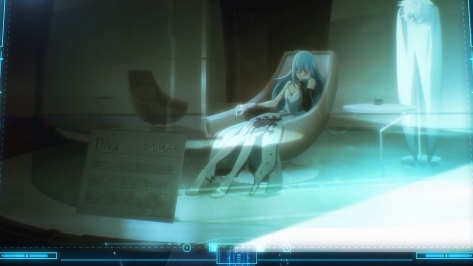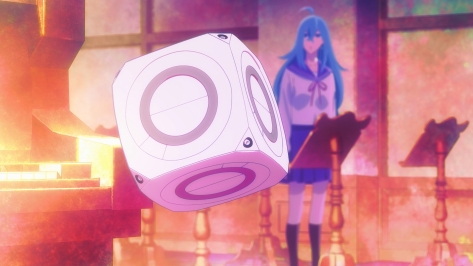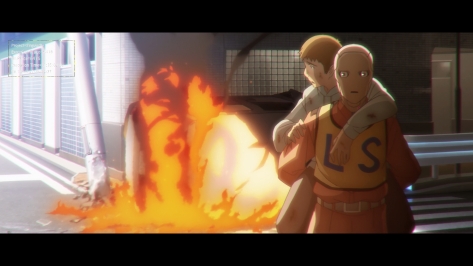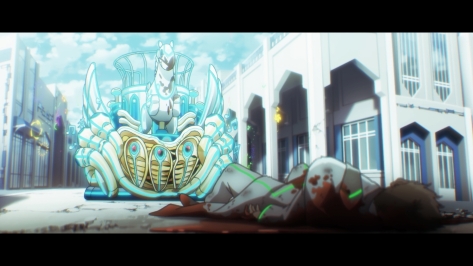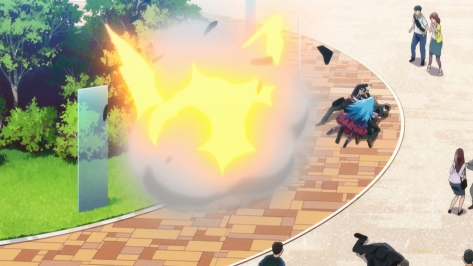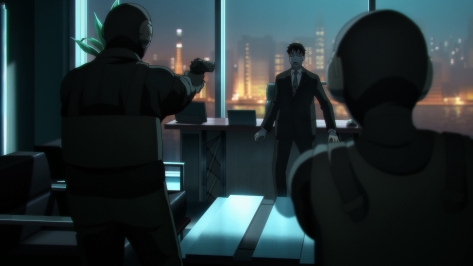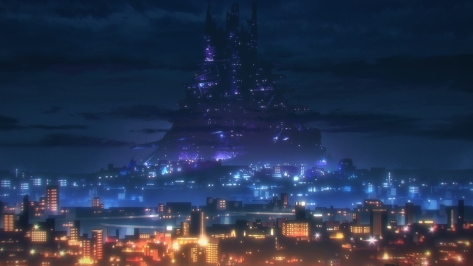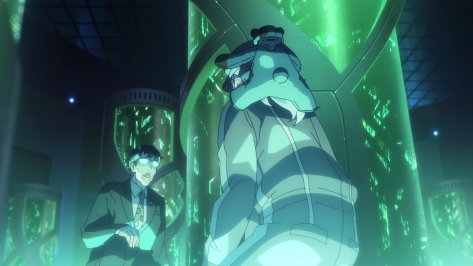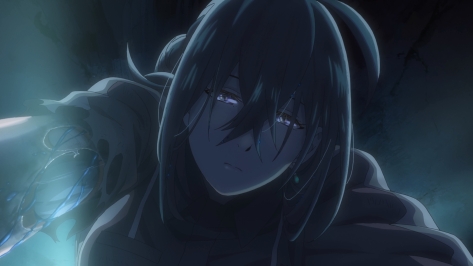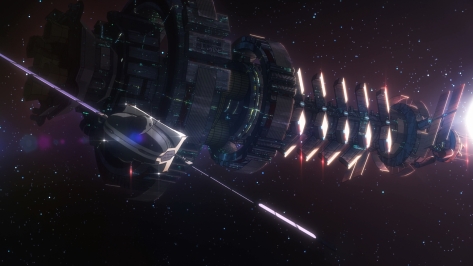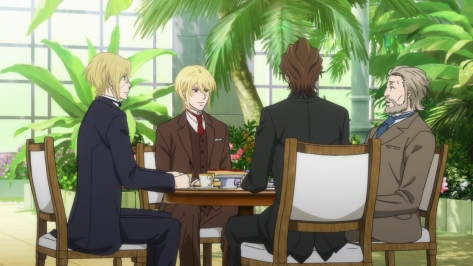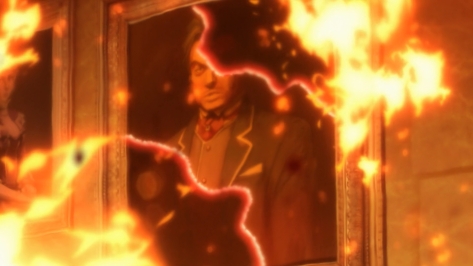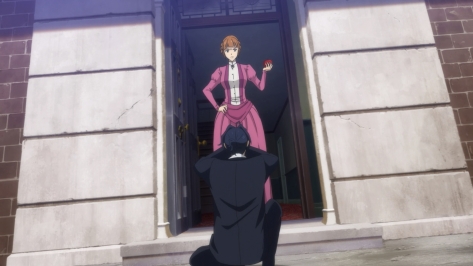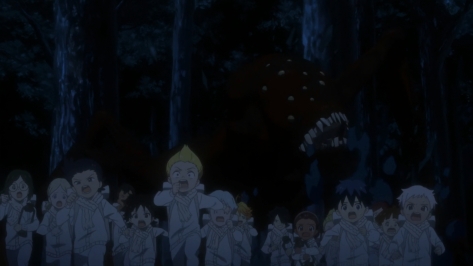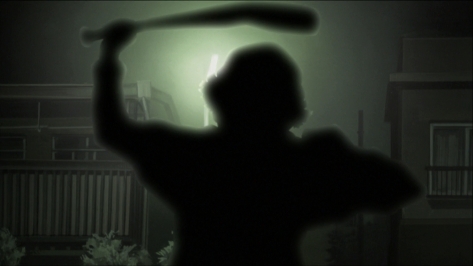Japanese Title: Vivy: Fluorite Eye’s Song
Similar: Steins;Gate
Ghost in the Shell: Stand Alone Complex
Watched in: Japanese & English
Genre: Action Science Fiction Thriller
Length: 13 episodes
Positives:
- Engaging and fast-paced time travel thriller
- Some fascinating future world concepts
Negatives:
- Wildly inconsistent art can be jarring
(Request an anime for review here.)
Take Terminator 2: Judgement Day, combine it with J-pop, and you have yourself a lovely old Vivy: Fluorite Eye’s Song. Sounds crazy, doesn’t it? But it works.
This story is about an AI called Vivy (a.k.a. Diva) charged with the mission of changing the past to alter the future where AI rose up and massacred humanity. A scientist in the future sends the AI Matsumoto to tell Vivy of the calamity and guide her through time. The scientist chose Vivy because is the last of the old AIs and wasn’t affected by the calamity, and as the first autonomous AI, she sits in a museum in the future, unaffected. Her design was to be a singer at a theme park, her dream to bring everyone joy. Matsumoto is of limited physical capacity, residing in either a teddy bear or a cube, but has great knowledge and analytical capabilities with a preference for hacking. And he loves to talk.
What immediately grabs me in Fluorite Eye’s Song is the world design and general atmosphere. The premise hooks me, yes, but we’ve seen similar many times before. I love the grounded feel of this clean near future world, akin to Ghost in the Shell: Stand Alone Complex.
We start at the genesis of the AI revolution. AI in the form of androids already exists, but they rarely pass for human. Each has a singular purpose – this AI is a waiter, this AI cleans the streets, this AI is an information guide, and so on, fulfilled with precision. AI do all menial jobs now, leading to a more utopian society. However, as the technology improves, they become more and more human. Thus, the question becomes, when do we treat them as human? When do they get rights? The opening scenario centres on this very question as a politician campaigns to give AIs names, treating them as individuals. Such dilemmas always fascinate me.
Fluorite’s story focus isn’t on these questions though; they are background to inform the main plot, which is the consequences of the answers garnered by these questions. In the future timeline, for instance, this politician dies in a blast setup by an anti-AI group. Unfortunately for this group, his death draws sympathy and support for a bill that few people initially cared about, setting in motion a series of catastrophic events. Vivy’s first mission is to keep him alive.
Funnily enough, the anti-AI group were right.
One change isn’t enough of course. Fifteen years later, Matsumoto returns to Vivy with a new mission, a new event to nudge in another direction. This time, an AI is going to crash a space hotel on a city. Furthermore, the previous change they made didn’t have the desired effects either, as is traditional for time edit stories. You fix one thing and a dozen other problems arise to take its place. This makes Fluorite engaging, for you never know what will happen next. You simultaneously experience relief when they avert one disaster and a sense of foreboding for the consequences of their actions. Fluorite evokes a bit of Steins;Gate in this way.
Each key event in the timeline occurs some years apart, so we get to jump through time and see the evolution of this world influenced by AI. A few human characters also stick around, aging with each time skip. This structure works.
While the main plot is a success, I do wish there was a little more time for the philosophical and moral aspect of AI. There’s a little bit with moments such a human marrying an AI, just not enough. Perhaps they thought it best not attempted if they couldn’t do it justice, as what is included is executed well enough. For those of you interested in the subject, I highly recommend the film Ex Machina and the series Star Trek: The Next Generation, specifically the episodes focused on the android Data (happened to rewatch stellar episodes “Measure of a Man” and “The Offspring” while going through this anime). Seeing those other titles does show how Fluorite could be better and have more depth in several ways. If the whole concept is new to you, then Fluorite will be an absolute ride – then watch the others afterwards (start Star Trek TNG at season two though – long explanation).
My other criticisms are towards the art and music. The art looks amazing sometimes with high detail, textured colouring, multi-layered shading, and fluid animation. Other times it has no detail, flat colours, single tone shading, and two-frame animation. We’ve seen plenty of amazing looking anime and plenty of downright ugly works, but I can’t recall one that is so inconsistent. This isn’t a case of great action and static in between either. It will randomly cut to high quality shots and then seconds later we’re looking at late 90s anime done on a computer. It stands out every time. Hard to describe without experiencing it for yourself.
As for the music, my criticism isn’t that it’s bad. I wish it were more creative. When you consider Fluorite is all about the future, advanced technology, and AI takeovers, I would expect the music to be more creative than generic J-pop. Even by today’s standards, there’s nothing in this music. Give me something wilder like the opera from The Fifth Element, where they used a computer to make the singer hit impossible notes, infusing that sci-fi element.
Inconsistent art and forgettable music aside, I had a great time with Vivy: Fluorite Eye’s Song. I want to go to that space hotel (with a different fate than in the anime, of course). It’s quite likely the best anime of its season. I have a couple of others I need to complete, though my sampling doesn’t promise anything better than this or Odd Taxi.
Overall Quality – High
Recommendation: Watch it. Vivy: Fluorite Eye’s Song is an easy recommendation.
(Request reviews here. Find out more about the rating system here.)
Awards: (hover over each award to see descriptions; click award for more recipients)
Positive: None
Negative: None

